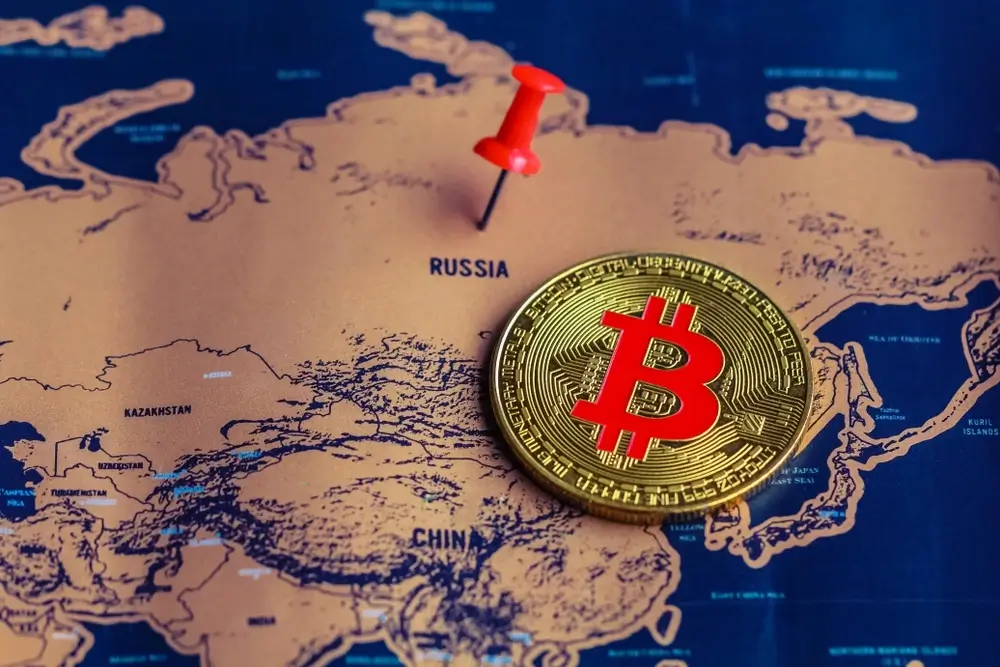Russia’s New Cryptocurrency Law Expected to Come Into Effect Soon
27.10.2024 17:00 2 min. read Kosta Gushterov
Russian President Vladimir Putin recently signed a new law on cryptocurrencies that expands the legal framework for their mining and related infrastructure across the country.
Taking effect on November 1, the law allows the Russian government to strengthen its control over cryptocurrency mining while increasing its oversight of digital currency-related activities. This development marks a significant shift in Russia’s approach to cryptocurrency regulation.
Passed by the State Duma, the lower house of the Russian parliament, the law allows authorities to impose restrictions on cryptocurrency mining activities based on location. In certain regions, restrictions on mining can be imposed based on electricity consumption and regional energy capacity. In addition, the law allows for the regulation of mining-related infrastructure, including control of mining pools within certain areas.
The Act also expands access to the Digital Currency Address Database to a variety of federal entities, expanding from a single Federal Financial Monitoring Service to multiple enforcement and law enforcement agencies. This change enhances Russia’s capacity to tackle illicit financing in the digital currency sector.
The National Mining Registry will transition from the Ministry of Digital Development to the Federal Tax Service, which will monitor mining company registrations and delist companies for repeated violations of requirements. Private entities that use limited electricity will not be required to register.
This regulatory change comes at a time when Russian companies are facing increased sanctions from the US, UK and EU preventing cross-border transactions. To mitigate these sanctions, legislative amendments in July legalized cryptocurrency mining, enabling Russian companies to maintain trade routes, especially with allies such as China, Iran and India.
-
1
South Korea Elects Pro-Crypto Leadership, Paving Way for Digital Asset Reforms
04.06.2025 22:00 2 min. read -
2
California Sets Stage for Crypto Payments in Government Licensing
04.06.2025 18:00 2 min. read -
3
Crypto Bill Sparks Uproar Over Trump Ties and Regulatory Conflicts
06.06.2025 10:00 1 min. read -
4
EU Eyes DeFi Rules Without Defining What It Is
07.06.2025 18:00 2 min. read -
5
Switzerland Prepares to Join Global Crypto Tax Network by 2026
07.06.2025 20:00 1 min. read
U.S. State of Connecticut Blocks Crypto from Public Sector Operations
Connecticut has made a clear move to keep digital assets out of government affairs.
Trump’s CFTC Pick Pledges Crypto Regulatory Clarity for Blockchain’s Future.
Brian Quintenz, President Trump’s selection to chair the Commodity Futures Trading Commission (CFTC), sees blockchain as a transformative force far beyond just finance.
Switzerland Prepares to Join Global Crypto Tax Network by 2026
Switzerland is gearing up to begin automatic crypto asset data sharing with over 70 countries, including all EU member states and the UK, as part of a broader push toward international tax transparency.
EU Eyes DeFi Rules Without Defining What It Is
As the European Union prepares for its next phase of crypto oversight, regulators are turning their attention to decentralized finance (DeFi)—without a clear definition of what decentralization actually means.
-
1
South Korea Elects Pro-Crypto Leadership, Paving Way for Digital Asset Reforms
04.06.2025 22:00 2 min. read -
2
California Sets Stage for Crypto Payments in Government Licensing
04.06.2025 18:00 2 min. read -
3
Crypto Bill Sparks Uproar Over Trump Ties and Regulatory Conflicts
06.06.2025 10:00 1 min. read -
4
EU Eyes DeFi Rules Without Defining What It Is
07.06.2025 18:00 2 min. read -
5
Switzerland Prepares to Join Global Crypto Tax Network by 2026
07.06.2025 20:00 1 min. read


